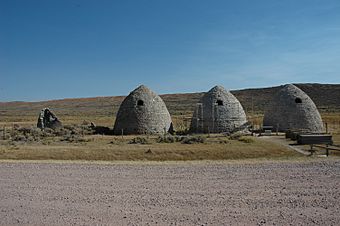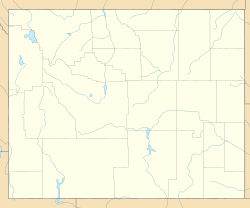Piedmont Charcoal Kilns State Historic Site facts for kids
Quick facts for kids |
|
|
Piedmont Charcoal Kilns
|
|

The three intact kilns and one mostly-destroyed one undergoing restoration in 2010
|
|
| Nearest city | Fort Bridger, Wyoming |
|---|---|
| Area | Less than one acre |
| Built | 1869 |
| Architect | Byrne, Moses |
| NRHP reference No. | 71000894 |
| Added to NRHP | June 03, 1971 |
The Piedmont Charcoal Kilns are old, beehive-shaped buildings in Piedmont, Wyoming. They were built a long time ago, around 1869, to make charcoal. Charcoal was very important back then for things like melting metals. These kilns are a special reminder of how people used to live and work in southwestern Wyoming. They stand near the old Piedmont Station, which was part of the Union Pacific Railroad.
Contents
Discovering the Piedmont Charcoal Kilns
The Piedmont Charcoal Kilns are a cool historical site in Wyoming. They show us a piece of the past when making charcoal was a big business. These kilns were built by a man named Moses Byrne in 1869. They are made from local sandstone and look like giant beehives. Each kiln is about 30 feet (9 meters) tall and 30 feet (9 meters) around. Their walls are very thick, about 24 inches (61 cm) wide!
What Are Charcoal Kilns?
Charcoal kilns are like big ovens. People would put wood inside them and heat it very slowly. They would let in only a little bit of air. This special process turns the wood into charcoal. Charcoal burns much hotter and cleaner than regular wood. This made it very useful for many jobs in the past.
Who Built These Kilns?
Moses Byrne settled in Piedmont around 1867. He was a builder and had even helped build some Pony Express stations. In 1869, Moses Byrne built five charcoal kilns in Piedmont. He wanted to make charcoal to sell. A special stone marker at the site says: "Charcoal Kilns were built by Moses Byrne, 1869, to supply the pioneer smelters in the Utah Valley." This means the charcoal was sent to places like Salt Lake City in the Utah Valley. There, it was used in small factories called smelters and by people who worked with metal, like blacksmiths.
What Happened to Them?
Over time, two of the five kilns were destroyed. But three of them are still standing today! The town of Piedmont itself is now a ghost town. This means most people have moved away, and not many buildings are left.
Protecting History
The Piedmont Charcoal Kilns are very important. Because of their history, they were added to the National Register of Historic Places in 1971. This is a list of places in the United States that are special and need to be protected. The state of Wyoming now takes care of the kilns. They are known as the Piedmont Charcoal Kilns State Historic Site. This helps make sure they stay safe for everyone to visit and learn from.
 | Tommie Smith |
 | Simone Manuel |
 | Shani Davis |
 | Simone Biles |
 | Alice Coachman |



